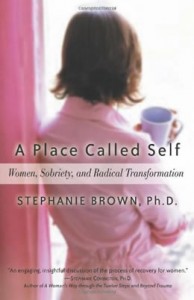 Last year, I blogged about Bill White’s interview with Roland Lamb, one of the key players in helping transform the behavioural healhcare system in Philadelphia to a system based on recovery. This system is concerned with both mental health and addiction, and is a $1 billion system caring for over 100,000 people.
Last year, I blogged about Bill White’s interview with Roland Lamb, one of the key players in helping transform the behavioural healhcare system in Philadelphia to a system based on recovery. This system is concerned with both mental health and addiction, and is a $1 billion system caring for over 100,000 people.
I’ve combined my four blogs into one, which highlights key parts of this very interesting interview. There is a lot we can learn from the Philadelphia in transforming our own behavioural health are systems.













 In an earlier blog, I referred to Stephanie Brown’s book
In an earlier blog, I referred to Stephanie Brown’s book  Here’s an interesting Wired In To Recovery blog from David McCartney from September 2013 about the importance of social relationships.
Here’s an interesting Wired In To Recovery blog from David McCartney from September 2013 about the importance of social relationships. I really liked this blog on Wired In To Recovery, which appeared in June 2010.
I really liked this blog on Wired In To Recovery, which appeared in June 2010. ‘Recovery has held so many surprises for me. Some good. Some bad. I didn’t know I could hurt so much. But I also didn’t know I could love so much and be so loved. I had no idea that recovery was also learning how to be in intimate relationships, learning how to have close, wonderful friends. Then there’s my marriage. My husband and I have developed a rich life together. And get this – I really like myself now. Learning about who I am and accepting me, that’s been the hardest part of recovery – and the best. I wouldn’t trade this path for anything in the world.’ Anne, Recoveree
‘Recovery has held so many surprises for me. Some good. Some bad. I didn’t know I could hurt so much. But I also didn’t know I could love so much and be so loved. I had no idea that recovery was also learning how to be in intimate relationships, learning how to have close, wonderful friends. Then there’s my marriage. My husband and I have developed a rich life together. And get this – I really like myself now. Learning about who I am and accepting me, that’s been the hardest part of recovery – and the best. I wouldn’t trade this path for anything in the world.’ Anne, Recoveree I’m almost nine months into my recovery journey, during which time I have not had a drop of alcohol. I’ve been reflecting back to my past, the time that I was drinking very heavily. Today, I can’t imagine drinking every day as I did, waking up with a hangover every morning. My mind just can’t seem to go back there.
I’m almost nine months into my recovery journey, during which time I have not had a drop of alcohol. I’ve been reflecting back to my past, the time that I was drinking very heavily. Today, I can’t imagine drinking every day as I did, waking up with a hangover every morning. My mind just can’t seem to go back there. Found this
Found this  I’ve had a pretty busy social week including a couple of special birthday gatherings, so I’ve not had time to upload content to the website. I’m also going to be a little busy with a planned surprise, so during this week I will focus on uploading some of my favourite content from WITR rather than write new material.
I’ve had a pretty busy social week including a couple of special birthday gatherings, so I’ve not had time to upload content to the website. I’m also going to be a little busy with a planned surprise, so during this week I will focus on uploading some of my favourite content from WITR rather than write new material.
